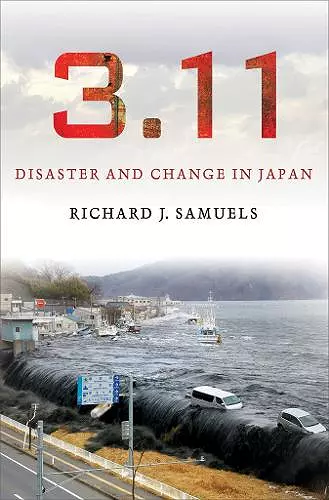3.11
Disaster and Change in Japan
Format:Hardback
Publisher:Cornell University Press
Published:15th Apr '13
Currently unavailable, and unfortunately no date known when it will be back

On March 11, 2011, Japan was struck by the shockwaves of a 9.0 magnitude undersea earthquake originating less than 50 miles off its eastern coastline. The most powerful earthquake to have hit Japan in recorded history, it produced a devastating tsunami with waves reaching heights of over 130 feet that in turn caused an unprecedented multireactor meltdown at Fukushima Daiichi Nuclear Power Plant. This triple catastrophe claimed almost 20,000 lives, destroyed whole towns, and will ultimately cost hundreds of billions of dollars for reconstruction.
In 3.11, Richard Samuels offers the first broad scholarly assessment of the disaster's impact on Japan's government and society. The events of March 2011 occurred after two decades of social and economic malaise—as well as considerable political and administrative dysfunction at both the national and local levels—and resulted in national soul-searching. Political reformers saw in the tragedy cause for hope: an opportunity for Japan to remake itself. Samuels explores Japan's post-earthquake actions in three key sectors: national security, energy policy, and local governance. For some reformers, 3.11 was a warning for Japan to overhaul its priorities and political processes. For others, it was a once-in-a-millennium event; they cautioned that while national policy could be improved, dramatic changes would be counterproductive. Still others declared that the catastrophe demonstrated the need to return to an idealized past and rebuild what has been lost to modernity and globalization.
Samuels chronicles the battles among these perspectives and analyzes various attempts to mobilize popular support by political entrepreneurs who repeatedly invoked three powerfully affective themes: leadership, community, and vulnerability. Assessing reformers' successes and failures as they used the catastrophe to push their particular agendas—and by examining the earthquake and its aftermath alongside prior disasters in Japan, China, and the United States—Samuels outlines Japan's rhetoric of crisis and shows how it has come to define post-3.11 politics and public policy.
[3.11] is clearly the product of a deep sympathy for the disaster's immediate victims and Japan as a whole.
-- Andrew E. Barshay * Political Science Quarterly *Samuels draws on a lifetime of experience researching Japan's politics and local government, military and energy policy, and political leadership and economy to craft a definitive political account of the country's response to the earthquake, tsunami, and nuclear accidents of March 11, 2011. In a narrative organized around the themes of vulnerability, leadership, community, and change, Samuels emphasizes how institutions of Japanese government and society shaped the disaster response.
* Library Journal *Samuels goes beyond the human tragedy of the massive earthquake and tsunami of March 11, 2011, to examine the disaster's impact on the subsequent political discourse in Japan.... Highly recommended.
* Choice *So why hasn't March 11, 2011, been the game-changer that many anticipated? Richard Samuels’ masterful account of Japan’s policy responses to its greatest crisis since World War II explains why continuity has trumped change. But maybe, just maybe, it hasn’t, as he also reminds us that the consequences are still unfolding.
* The Japan Times *This is a carefully argued book, based on immense research and deep understanding of underlying causes.
-- J. A. A. Stockwin * Journal of Japanese StudiISBN: 9780801452000
Dimensions: unknown
Weight: 907g
294 pages